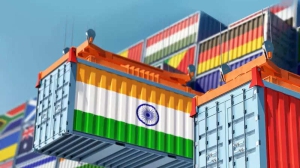Finally, the school of Hindutva which is based on cultural principles and building normative power (through Deen dayal Upadhyaya and Vivekananda) is present in views of scholars like Ian Hall . Normative power is very important for country like India which is still building military or economic power. So, use of religion (Hinduism, Buddhism), spirituality and culture as foreign policy tool is a very important strategy. This is the way forward if India wishes to become a Vishwa guru .PM Modi has tried to reflect this image and legacy forward as a blend of Gandhi, Buddhism and Hinduism.
Taking these principles forward and using them in context of current issue like India-China relation is very important as they provide us with the intellectual capital and various policy options to tackle them efficiently. If we take a hyperrealist view on how India can tackle China then issues like defense expenditure and formation of alliances for balancing China come out. Super realist like Karnad and Sarkar will always want defense expenditure as a percentage of GDP to increase. India must become a cradle for developing extraordinary and world class weapon system and be prepared for war. Indian Military must be prepared to tackle the “single-minded drive†of China to promote their strategic interests even in the present COVID times. Also, if India tries to build alliances to counter China, it cannot ally with USA as they are outsiders and move away from Asia. India can make alliance with countries from South east Asia like Japan, South Korea, Vietnam and Taiwan to counter and circle China and tackle geopolitical moves like building of String of Pearls.
For hyperrealists, interests are permanent not the enemies. But for a realist like Rana who is also from old Nehruvian school, coercion and pressure tactics is more important. Both China and India are nuclear power so India must look for political allies amongst weak states in the region. Also, the current US- China trade war and covid induced geostrategic rivalry can be used for dexterous maneuvering by India, through coming close to USA and getting better technology from them. This can be a good answer to Chinese Weiqi strategy of gradual normative encircling.
Looking this issue from new Nehruvian version of Bajpai, will take the Indo China relation to cognitive dissonance. India and China do not perceive each other properly and Indian government must try to surpass the elite gatekeepers of communist regime in China and increase efforts of public diplomacy and people to people contact to bridge the gap between the two countries.
Ian Hall’s logic on building of Normative power through use of Hinduism and Buddhism as foreign policy tool connects with this argument on people to people contact and religion being the basis of public diplomacy. Further, neo liberalism as mentioned by Bajpai gives a totally different angle to the relations. Taking a stance, completely opposite to that of Karnad and Nehru Neo liberals will try to ally with USA and balance off China. Increasing trade ties between the two countries and building complex interdependence will be very important. Although it may be asymmetric as China is a bigger power and has a trade surplus of around 45 billion dollars with India at present(2020). Trade deficit with China has come to a seven year low as businesses in India face the covid induced disruption. But overall trade is a good strategy to soften up the relations and gradually bring the two countries closer.
Gandhian and cultural principles as a part of foreign policy are very important in terms of soft power. As India is trying to develop enough hard power to deter China, building image of a peaceful, nonviolent country can attract Chinese who follow Buddhism. The spiritual wealth of the country can be used to give a message to China that we are not a threat. Visit of PM Modi to Buddhist religious places (Daxingshan temple) in China is a logical signaling in this context.
So, in nutshell five different strategies based on Nehruvian, Neoliberal, Realist, Gandhian and cultural principles are at the core of Indian foreign policy. These have been used from time to time by Indian government in tackling relations with other countries. Although India is moving forward with amalgamation of Neoliberal approach and cultural principles mainly to built on it’s soft power, acceptance of realist school in India cannot be neglected with rise of Modi in power. There is no single dominant strategy guiding Indian foreign policy since independence. But the challenge is to use these strategies in an efficient manner to tackle issues like health based robust foreign policy, Indo-Pak conflict and India -China border issue .
The writer is an incoming candidate at LSE. He is an alumnus of Lee Kuan Yew School of Public Policy, NUS and Indian Institute of Management, Ranchi.

























